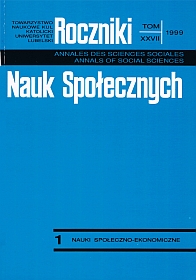Hierarchiczny charakter dobra wspólnego w ujęciu przedstawicieli szkoły lubelskiej
Abstrakt
A human person, that is by its nature a social entity, calls into being various types of communities, societies, which become a new reality as subjects of actions. A person, by the fact that it is part of a whole does not lose his existential sovereignty. He still remains a person and joins the process of realising goods that are necessary for perfecting himself. However, when a given society proves to be unable to realise a defined category of goods that are necessary for a man and for this little society so that they can develop, other ones are called into being, higher and bigger, able to perform the task. They are a whole in which societies of a lower rank function as its parts. Smaller and lower societies, however, do not lose their autonomy within the range of the functions they fulfil and the aims they achieve. This process is closed when such a society appears that unites functionally differentiated societies of lower ranks. An example may be here the state society and, in a further perspective, the universal society. Hierarchy that exists in social life is expressed in the multitude and multistage character of human societies. The hierarchical character of common good in turn implies pluralism of common good.
Bibliografia
Kondziela J.: Filozofia społeczna. Zagadnienia wybrane. Lublin 1972.
Krucina J.: Dobro wspólne. Teoria i jej zastosowanie. Wrocław 1972.
Majka J.: Etyka społeczna i polityczna. Warszawa 1993.
Majka J.: Jaka Polska? Węzłowe problemy katolickiej nauki społecznej. Wrocław 1991.
Novak M.: Wolne osoby i dobro wspólne. Kraków 1998.
Piwowarski W.: ABC katolickiej nauki społecznej. Pelplin 1993.
Piwowarski W.: Zasada pomocniczości w pismach św. Tomasza z Akwinu. „Roczniki Filozoficzne” 10:1962 z. 2 s. 68-87.
Ramirez S.: Doctrina politica de Santo Thomas. Madrid 1952.
Simon Y. R.: Filozofia rządu demokratycznego. Kraków 1993.
Strzeszewski Cz.: Hierarchia dóbr wspólnych a naturalna hierarchia społeczności. „Roczniki Filozoficzne” 14:1966 z. 2 s. 5-11.
Copyright (c) 1999 Roczniki Nauk Społecznych

Utwór dostępny jest na licencji Creative Commons Uznanie autorstwa – Użycie niekomercyjne – Bez utworów zależnych 4.0 Międzynarodowe.


